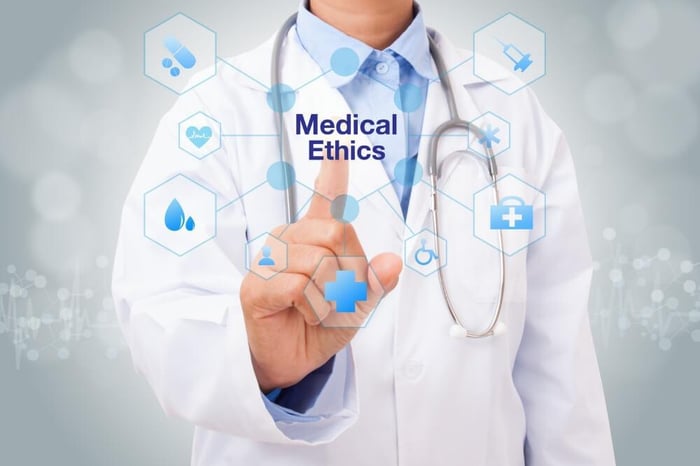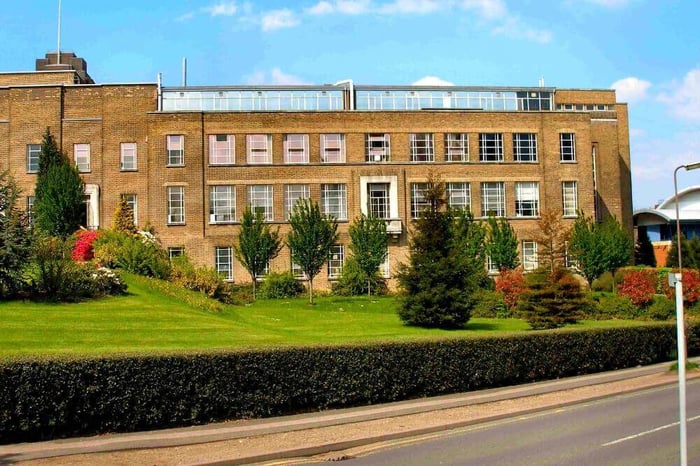
The Importance of Medical Ethics
Medical ethics has a long history, from the days of Hippocrates to the present. The concept of ethics is very dynamic and the same ethical principles are not necessarily followed everywhere around the world. Medical ethics will quickly become part of your life upon gaining a place at medical school, but an appreciation of modern medical ethics is also a necessary tool for your medical school interview, as you will undoubtedly encounter ethical questions. This is why we will provide you with an introduction to the field of medical ethics and its basic principles, to help start you on your journey in the medical profession.

A lot of world religions teach us ethical codes that are accepted as moral norms, such as don’t steal, don’t kill, don’t be an adulterer, honour your parents, etc. These ethical codes are accepted by most without question but unfortunately, they are not encompassing enough when it comes to the world of medicine.
Simply being of moral character does not provide enough framework for the doctor to know how to act and make appropriate decisions. Having a system of medical ethics that is widely accepted gives you a starting point for tackling the difficult dilemmas put forward by medicine. It is worth remembering that medical ethics is not just the domain for clinical trials, but forms part of the daily life of every doctor.

Medical ethics scenarios
A 70-year-old man is at the doctor’s clinic with an abdominal aortic aneurysm (AAA) (a widening of a blood vessel in the abdomen), which he has been told has a 10% chance per year of bursting and killing him almost instantly. He has been told that the surgeons can fix it, but he has a 5% chance of dying during the procedure.
It can be seen here that there is no moral conflict. The patient wants to live and assuming moral norms, the doctor wants the patient to live, too. This still, however, leaves the ethical issue of whether or not the operation should be done.
This is because the procedure carries an inherent risk associated with it, which cannot be fully mitigated against. Of course, guidelines based on evidence are present to help advise when and where certain procedures should and shouldn’t be done. These guidelines, however, cannot cover every situation, will be generalised in nature and will consider the population as a whole, rather than the individual. It becomes apparent that doctors need a framework for making ethical decisions in order to advise and treat their individual patients correctly.
Many great physicians and philosophers, such as Hippocrates, Aristotle and Immanuel Kant have tried to define such a framework. Most Western medicine follows the “four principles” approach, put forward by Tom Beauchamp and James Childress in their book “Principles of biomedical ethics”. This is popularly becoming known as principlism.
This system of ethics follows four main principles, or four pillars of medical ethics, which can be applied to biomedical ethics: Autonomy, Beneficence, Non-maleficence and Justice.

Autonomy
This ethical principle of autonomy relates to the patient's right to choose. It comes from the Greek language and literally means self-rule or self-governance. It is a concept that is relatively modern and until recently, there was often a paternalistic doctor-patient relationship, with “the doctor knows best” mentality and patients putting their lives in their doctor’s hands. Some of your patients still often ask for this approach and will ask you to make the decision, so we must be careful to make sure we respect their autonomy.
With respect to our gentleman with his AAA, a doctor cannot tell him whether or not to have the operation, but merely can point out the facts, which would include details of the procedure, intended benefits, foreseeable risks and any other information that the patient may find relevant to the procedure, such as recovery time, length of hospital stay, etc. It is the doctor’s job to provide the information, such that the patient can make a balanced and informed decision as to whether they consent to the procedure or not.
It is also the responsibility of the doctor to present the information in a way and at a level that the patient understands. The patient cannot make an autonomous decision if they do not understand what was happening. Problems with autonomy occur when we do not believe that the patient has the mental capacity to make an informed autonomous decision.
Great care is taken in medicine to establish whether or not someone has mental capacity, and it must be remembered that certain disease processes can impact on capacity, such as delirium, dementia and neurological disease. In returning to our example, I think autonomy forms the crux of ethical debate for this gentleman.
The surgeons have offered to do the operation with the intended benefit of prolonging his life. They have also pointed out the possibility of unintended harm in the operation. This leaves it in the patient's hands to make the decision as to whether he finds the 5% risk of dying a suitable trade-off for likely extending his life by several years. This is a decision that must be taken autonomously by him, since the 5% risk is acceptable to some and not to others.
Autonomy also allows the patient to follow their own cultural, religious and spiritual beliefs with regards to treatment.

Beneficence
Beneficence is a principle that says that our actions should contribute to or improve our patients’ welfare, or essentially do good.
It is closely linked with non-maleficence and there isn’t a sharp cut-off between the two principles since lots of medical interventions are both beneficial, but carry some risk or side effect that may be detrimental. In certain ethical systems, non-maleficence and beneficence are one ethical principle covering a spectrum between doing no harm and doing only good.
The principle of beneficence sounds easy since most of us want to do the right thing for our patients and improve their health outcomes, so where is the difficulty? In the case of the man with AAA, it seems obvious that the operation gives him a 95% chance of extending his life and this is obviously beneficial.
We have discussed balancing this against non-maleficence, but suppose I now add to the scenario an advance in medicine that offers an alternative procedure that fixes the AAA, but with only a 1% death rate. The trouble is that the new procedure costs 10 times as much. This suggests that at some point, we have to put a constraint on beneficence, as we are limited by practical constraints, such as cost, time and number of doctors.
In the end, our medical resources are finite and we have to bring about the results for the population as a whole, meaning that not every treatment may be offered. There is often controversy in the news, where very expensive drugs that would benefit people with rare conditions are not offered on the NHS in the UK or on private insurances in the United States because they do not provide the best population health outcomes. This leads well into the principle of justice, which we will discuss shortly.
Non-maleficence
Non-maleficence is the aim of not inflicting harm on others. Harm in medicine usually refers to physical or psychological harm. There was a similar statement in the Hippocratic oath. This is often a tricky concept for medical doctors, because certainly some of our procedures have harm as a foreseen side effect, yet we still do the procedures.
If we look at the man in our example above, the surgeons have stated death as a possible outcome. Also, we have not mentioned the fact that he could feel quite sick and ill from the anaesthetic and may suffer pain from the surgery, so how is this acceptable?
A way of trying to specify the principle is that an action may be seen to have two effects, one good and one harmful, which in the case of our gentleman may be weighed up as a good improvement in lifespan versus death. In this case, the surgeons may do the operation with the intended effect of extending the patient’s life, but with the foreseen but unintended risk of death during the operation. Under these circumstances, it may be seen as morally appropriate to proceed with the operation.
Essentially, we are striking a balance between non-maleficence and beneficence here and this becomes part of the daily routine of a doctor. Even with things that may seem trivial, such as an X-ray, the doctor should be thinking whether the harm done by the radiation is justified.

Justice
The concept of justice relates to fairness. The formal principle of justice is often attributed to Aristotle, who is alleged to have said: “Equals must be treated equally and unequal must be treated unequally”. This takes a bit of getting your head around to start with, but essentially it means that not everybody in society needs to be treated the same, but we must treat people of a similar demographic the same way.
An example of this could go back to our poor old gentleman with his AAA with both methods of treatment now available to him. It would not be considered justice if he were offered the first procedure if he lived in one part of the country, but the safer procedure if he lived in another. This would not be seen as justice, seeing as he is being discriminated against based on where he lives.
There have been many cases in the news in the UK talking about access to cancer therapies being a “postcode lottery”, with the general public perceiving this as unfair and as a conflict of interest. It may also be possible that the NHS could offer both procedures and this still fits the criteria for justice.
Imagine that instead of being 70, our AAA man is now 60, very fit, still working and runs half marathons, he could be looking at 40 years more to live with the procedure and it may make sense to use funding for the more expensive procedure. Now we propose the converse and instead of being 60, the man is 92, still smoking and, although fit enough for the operation, is generally of low mobility. Then it may make sense to treat him with the cheaper operation, so that you have more money left to serve other people. This is not going against the principle of justice, because you are saying that the situation of the two patients is different.
Medical ethical scenarios to consider
- Withdrawal of ventilation in a dying patient
- Treatment of patients with self-inflicted disease
- Termination of pregnancy
- Management and treatment of people with dementia
- Use of highly expensive treatments for rare diseases
- Use of animals in clinical trials
- Use of humans in clinical trials
- Euthanasia
- Should we be carrying out bariatric surgery?
- Should doctors ever go on strike?
We hope this has been a helpful overview of medical ethics and its importance in your future career as a healthcare professional. For further information, the General Medical Council’s ethical guidance for doctors is an excellent resource for strengthening your knowledge on the topic.
Good luck with your interview and if you have any other questions, don’t hesitate to contact us at [email protected].



